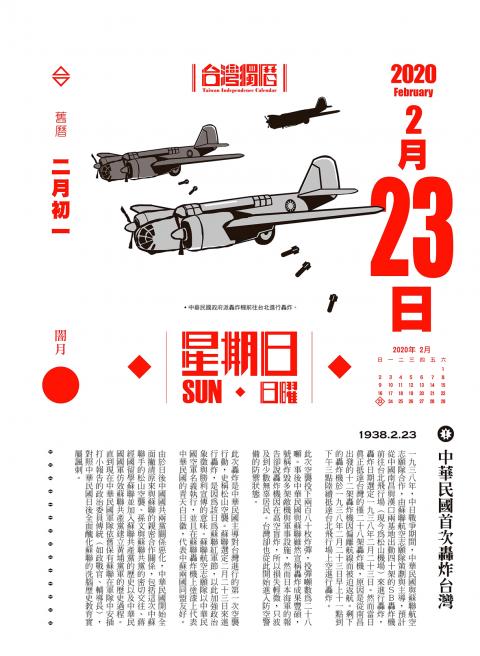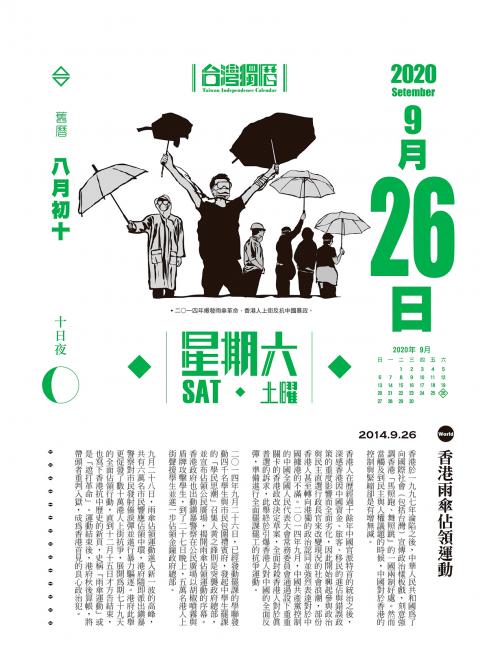Following the success of this year’s Taiwan Independence Calendar, its designer has come up with a new version for next year, with each date featuring historical events or symbolic figures in the development of Taiwan’s democracy.
The calendar is more than a practical everyday object, as it is also a reminder for people to cherish the democracy hard-earned through the sweat and blood of their predecessors, said the designer, known by the name Mock Mayson.
“It is named Taiwan Independence Calendar to convey the hope that Taiwan could start brand new as an independent state someday,” Mayson said.

Photo courtesy of Avanguard Publishing House
When the calendar was introduced last year, it quickly sold out and even went viral, with many people sharing their unboxing experiences in videos, he said.
Mayson said that the idea for the calendar stemmed from a discussion he had with friends that while there were several special days in Taiwan’s history, it hardly has any holidays of its own.
Most holidays were proclaimed and observed in the context of the Republic of China, with the interpretation of history inclining more toward the Chinese end of the spectrum, he said.

Photo courtesy of Avanguard Publishing House
Examples of these holidays are Retrocession Day or the birthdays of Sun Yat-sen (孫逸仙) and Chiang Kai-shek (蔣介石), Mayson said, adding that the only holiday historically and culturally exclusive to Taiwan is 228 Peace Memorial Day.
That is why he in 2014 started collecting materials to make a calendar dedicated to commemorating the special days in Taiwan’s history, he said.
Tearing sheets off the calendar is the realization of the metaphor that democracy can be fragile, as memories of such incidents can be forgotten as easily as calendar pages thrown into the wind, Mayson said.
“The totalitarian party-state of the past left many Taiwanese more familiar with Chinese history than Taiwanese history, so I hope this calendar can allow bits and pieces of Taiwan’s history to enter people’s lives silently and smoothly,” Mayson said.
He said that like many others, he also used to believe that protesters who fought for their rights were “rioters,” as that is what they were described as by TV news channels — which were then all controlled by the then-Chinese Nationalist Party (KMT) regime — when there was a protest march.
It was only after he had the chance to take a closer look at the protesters — as a student at a high school near the Legislative Yuan in Taipei — that he realized that these “rioters” were actually groups of ordinary people, he added.
Mayson said that his history teacher taught students the parts of history that the KMT wanted to conceal, which fueled his desire to present such stories with illustrations to show people what happened in Taiwan’s past.
Most of the incidents featured in the calendar are those that changed society for the better and the figures are mostly spiritual leaders who lifted up those around them, he said.
Some major social issues abroad have also been included in this year’s calendar, Mayson said, citing Sept. 26, which is dedicated to Hong Kong’s pro-democracy “Umbrella movement.”
The ongoing anti-extradition bill protests in Hong Kong were also added, he said.
“The twisted interpretation of history has diverted Taiwanese away from true freedom fighters to pied pipers leading them to red hell,” Mayson said.
This corresponds with a local saying: “Reluctant to walk with a human, but happy to follow the footsteps of a ghost,” he added.
Mayson said that his philosophy for the calendar could not be simpler: guide the misled back to the human world and every single soul counts.

Civil society groups yesterday protested outside the Legislative Yuan, decrying Chinese Nationalist Party (KMT) efforts to pass three major bills that they said would seriously harm Taiwan’s democracy, and called to oust KMT caucus whip Fu Kun-chi (傅?萁). It was the second night of the three-day “Bluebird wintertime action” protests in Taipei, with organizers announcing that 8,000 people attended. Organized by Taiwan Citizen Front, the Economic Democracy Union (EDU) and a coalition of civil groups, about 6,000 people began a demonstration in front of KMT party headquarters in Taipei on Wednesday, organizers said. For the third day, the organizers asked people to assemble

Taipei is participating in Osaka’s Festival of Lights this year, with a 3m-tall bubble tea light installation symbolizing Taiwan’s bubble tea culture. The installation is designed as a bubble tea cup and features illustrations of Taipei’s iconic landmarks, such as Taipei 101, the Red House and North Gate, as well as soup dumplings and the matchmaking deity the Old Man Under the Moon (月下老人), affectionately known as Yue Lao (月老). Taipei and Osaka have collaborated closely on tourism and culture since Taipei first participated in the festival in 2018, the Taipei City Department of Information and Tourism said. In February, Osaka represented

POOR IMPLEMENTATION: Teachers welcomed the suspension, saying that the scheme disrupted school schedules, quality of learning and the milk market A policy to offer free milk to all school-age children nationwide is to be suspended next year due to multiple problems arising from implementation of the policy, the Executive Yuan announced yesterday. The policy was designed to increase the calcium intake of school-age children in Taiwan by drinking milk, as more than 80 percent drink less than 240ml per day. The recommended amount is 480ml. It was also implemented to help Taiwanese dairy farmers counter competition from fresh milk produced in New Zealand, which is to be imported to Taiwan tariff-free next year when the Agreement Between New Zealand and

IDENTITY SHIFT: Asked to choose to identify as either Taiwanese or Chinese, 83.3 percent of respondents chose Taiwanese, while 8.4 percent chose Chinese An overwhelming majority of Taiwanese, 71.5 percent, think that Taiwan should compete in international competitions under the name “Taiwan,” a Taiwan Brain Trust survey published yesterday showed. Referring to Taiwan’s victory last month at the World Baseball Softball Confederation’s Premier12, the survey results showed that 89.1 percent of respondents said that Taiwan’s exceptional performance in sporting competitions furthers national unity. Only 18.8 percent of respondents supported Taiwanese teams’ continued use of the name “Chinese Taipei” in international sporting competitions, the survey showed. Among Taiwan’s leading political parties, the name “Team Taiwan” was supported by 91.1 percent of self-identified Democratic Progressive Party (DPP) supporters,